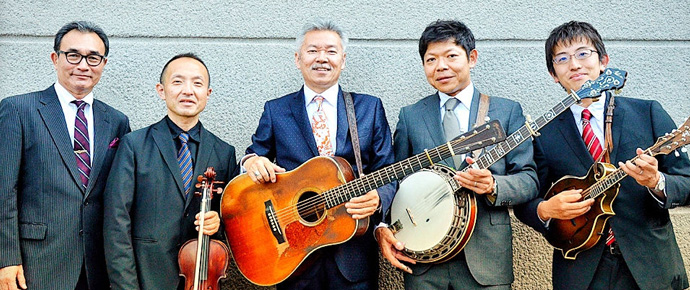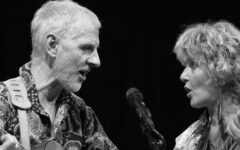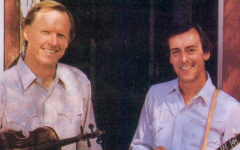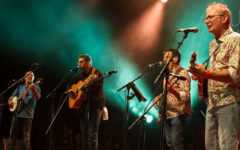
As unlikely as it might have once seemed, the Japanese have always had a fascination with American music. Their preference for jazz was evident immediately after the end of the Second World War, and with the advent of the ’50s and ’60s, that obsession grew and prospered while coming to include rock, country, avant-garde, and all other forms of American musical expression. It was fostered early on by the influx of service men and woman who were stationed on Japanese soil, and then nurtured and expanded steadily from there.
In the midst of that cultural crossover, bluegrass took hold as well, resulting in any number of Japanese musicians who have proven themselves the equals of those who first purveyed it in the American heartland. Among those dedicated disciples is one Kazuhiro Inaba, widely recognized as one of his country’s most accomplished guitar, banjo, and mandolin pickers and a superb singer as well. Having made his mark in his native country, as well as with his frequent visits to the US, he’s had the opportunity to perform with an increasing number of American bluegrass greats.
Naturally then, Inaba is quick to cite the influence of American music on bluegrass aficionados and enthusiasts back home. “I think that some American mountain music sounds similar to old Japanese folk songs played throughout the country,” Inaba says, noting that the banjo happens to look and sound similar to the shamisen, a traditional three-string Japanese instrument played with a plectrum called a bachi. “In the 1950s, we in Japan started to be exposed to a lot of American culture. In that time, classic country hits like Tennessee Waltz, Molly Darling and I Really Don’t Want To Know became very popular here. Beginning in the 1970s, many top American bluegrass artists like Flatt & Scruggs, Bill Monroe, Ralph Stanley, Jim & Jesse, the Osborne Brothers, J.D. Crowe, the David Grisman Quintet, New Grass Revival, and many more began touring in Japan.”
Born in Osaka in 1960, Inaba began playing 5-string banjo at the age of 15. “My father, Etsuro Inaba, and his sister, Kayo Ito, had been interested in country and bluegrass music since their youth, and they listened to that music at home,” Inaba recalls. “My brother Masatoshi started to play the mandolin around 1974. When I became interested in playing banjo, my father and I took lessons together.”
It was little wonder then that making music became a family business once Inaba and Masatoshi began performing together in the mid ’70s. By the early ’80s, Inaba had brought his own skills to the US, and in 1983, he won a second place award at the prestigious Old Fiddler’s Convention in Galax, Virginia. In short order, he became a regular on the festival circuit throughout the States and Canada. He continues to make frequent stops in Nashville to play at the iconic Station Inn, where he’s shared stages with such renowned players as Missy Raines, Bobby Hicks, Don Rigsby, Keith Little, and Randy Howard in a sometimes-supergroup known as the Bluegrass Brothers. That led to a stint with Butch Robins’ World International Bluegrass Band, which found him serving as the group’s lead singer and guitarist.
Inaba has also released seven solo albums over the past 35 years — Shore To Shore (1986), Hard Times, Come Again No More (1989), Goin’ Across the Sea (1993), Dixie Dream (1999), Country Songs for Singing (2002), Teardrop on a Rose (2003), and Country Heart (2009). Many of those recordings have featured special guests, a roll call of top talents that’s included Bobby Hicks, Butch Robins, Roland White, Buddy Spicher, Lloyd Green, Hargus “Pig” Robbins, Pete Wade, and Charlie McCoy. In addition to serving up his original instrumentals, he mostly sticks to standards, including songs written by Bill Monroe, Flattt & Scruggs, the Stanley Brothers, the Osborne Brothers, Jim & Jesse, Doc Watson, and Larry Sparks.
“I only sing in English,” Inaba explains. “Unfortunately, I don’t think many of my audiences understand the lyrics. However, I usually try to express the feeling of the songs as much as possible. The audiences here enjoy the melodies and the sounds very much, even though they have a hard time understanding the meanings.”
In addition to his frequent radio and television appearances back home, he’s also a successful concert promoter and a regular at workshops throughout Japan. For the past eight years, he’s held his own homegrown bluegrass festival and retreat in Osaka — the Kazuhiro Inaba Bluegrass Camp — while continuing to sponsor annual trips to the US for Japanese bluegrass fans who want to experience American music firsthand in the music’s original environs. Likewise, he consistently tours, both solo and with his award-winning group, Bluegrass Ramble, and makes a variety of festival appearances with a revolving cast of international artists.
“Bluegrass sounds pure and natural to many people around the world,” Inaba concludes when asked to explain its international popularity. “The acoustic sound is always pleasant for all ages to listen to.”







